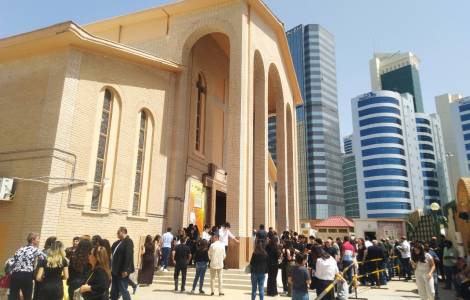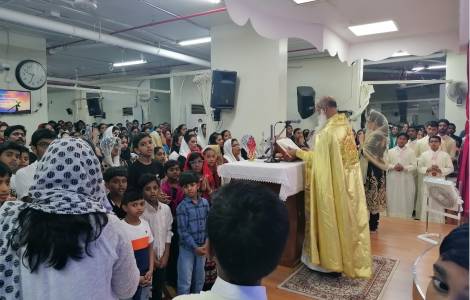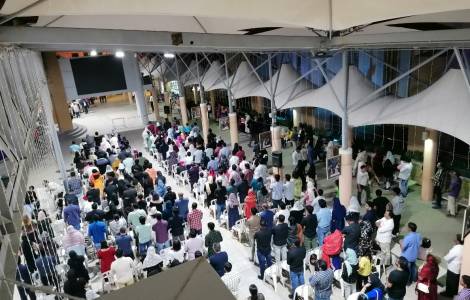
AP
by Antonella Prenna
Kuwait City (Agenzia Fides) - Maronite, Coptic Catholic, Syro Malabar, Syro Malankara, Melkite and Latin are the six rites that bring together in one large Church the varied Catholic community of Kuwait, which is part of the Apostolic Vicariate of Northern Arabia in Kuwait.
Every day, thousands of Catholics of different origins and backgrounds crowd the four parishes: the Co-Cathedral of the Holy Family in Kuwait City, the parish-shrine of Our Lady of Arabia in Ahmadi, the church of Saint Therese located in the heart of the Indian community of Salmiya, and the more recent one, dedicated to Saint Daniel Comboni, in Abbasaya. All diverse in language, ethnicity, age, traditions and cultures. All united by Baptism in the one Body of Jesus Christ, together with the brothers and sisters who attend the small church of the Malkite rite in Kuwait City.
“What gives vitality to these parishes, together with the priests, are first and foremost the lay people, including the members of the Parish Council, the readers, the ministers of the Eucharist, the altar servers, the choirs, the catechists, the pastoral assistants and the workers who provide their service there", says to Fides Bishop Aldo Berardi, O.SS.T., Apostolic Vicar of Northern Arabia, who together with a community of Capuchin friars and other diocesan priests or Fidei Donum takes care of the pastoral care of the faithful. Despite the restrictions of the situation, all the priests present in Kuwait celebrate masses in the various languages, hear confessions and carry out ordinary parish activities in the places assigned to them.
It seems a paradox, the vitality of the multitude of Catholic faithful that springs up in the heart of a country totally shaped by Islam. There are more than 350 thousand. The vast majority are in Kuwait for work reasons, often without the families from whom they remain separated for months or years. They are Filipinos, Indians, Pakistanis, Sinhalese, Lebanese... who after exhausting days of work meet to pray. They form long lines to enter the church, in the different rooms set up and made available inside the Co-Cathedral; They share prayer spaces marked by precise schedules, each one in their own language and ritual, with total respect. They are men, women and children who animate the celebrations and who transmit with their presence a filial and unconditional love for God.
The “masses in the basement”
There are thousands of faithful who gather in the "basements" of some large buildings to pray, adore the Blessed Sacrament and attend mass. They are cramped environments and often not logistically safe. But they are there. They are the living presence of the Church, which testifies to its faith with its perseverance, even in less than "normal" conditions.
Father Johny Lonys, OFM cap., Episcopal Vicar, is the Syro-Malabar parish priest of Abbasiya, better known as Little Kerala. “Our 15 thousand parishioners”, says Father Johny “take turns celebrating all 3 Indian rites in three 'semi-basements'. We have a small room, that of Our Lady of Arabia Hall, which is the only place where there is adoration of the Blessed Sacrament. There are about three thousand catechism students, 2800 of the Malabar rite and 362 in the English language, and they are attented by 130 catechists."
The presence of the Maronite community followed by Msgr. Raymond Mtanios EID, in Kuwait since 2012, is equally strong. Meetings and activities with young people and families are held at the Jabriya centre, a large mainly residential area where the Lebanese Maronite community meets, but on Sundays they move to the Co-Cathedral of Kuwait City.
The area that delimits the space of the Co-Cathedral of the "Holy Family" is immense. Here, every Friday from early morning thousands of people begin to arrive for religious services that culminate with those on Saturday evening. Masses are celebrated in 14 languages: Arabic, English, Tagalog, Malayalam, Tamil, Bengali, Urdu, Hindi, Spanish, French, Italian, Sinhala, Korean, Konkani. Parish priest Fr. Gaspar Fernandes, OFM Cap., celebrates Mass in 5 languages: Korean, Spanish, Urdu, Konkani and English. He arrived at the Vicariate of Kuwait on 9 December 2009, and was parish priest of the Co-Cathedral of the Holy Family from 22 January 2010 to 19 October 2012 and then moved to the parish of Our Lady of Arabia, in Ahmadi. After a period in Goa he returned as parish priest of the Co-Cathedral on 18 November 2022.
The great Easter celebration
During the Easter Triduum, the uninterrupted 24-hour rotation of the faithful of six rites is impressive. All of them contribute indistinctly to giving life to the culminating moment of the liturgical year. It starts on Saturday afternoon and continues all night until Sunday evening.
While at 3 in the morning from one of the rooms inside the compound you can hear the songs of the Syro Malankara community celebrating the resurrection of Jesus, in the large courtyard of the Co-Cathedral the Filipino community stages a touching representation of the Triduum, from the Passion to the Death of Jesus up to the meeting of the Risen Lord with his mother Mary on Easter morning. Specifically, at four in the morning the statue of the Virgin Mary, in the wake of the choir of angels, performed by children who remove her black veil, is accompanied by a group of women towards the statue of the Risen Jesus carried in turn by a group of men.
Respect for traditions
The Coptic-Catholic community present in the Co-Cathedral continued to celebrate their masses according to the Julian calendar. It will celebrate Easter in May.
During the Ramadan period, which has just ended, even the Catholic faithful were respectful of the traditions of their Muslim brothers. No food or drink during the day. “many more churches are needed”
The Co-Cathedral, in addition to being the seat of the Catholic Bishop in Kuwait, is also a living testimony of Catholicism in the country. It is located on land donated in 1956 by the Emir and the Government of Kuwait. It was solemnly blessed and consecrated in 1961 by the first bishop of the country, the Carmelite Theophanus Stella, O.C.D., who, taking into account the particular circumstances in which the Catholics of Kuwait lived, that is, as temporary residents, decided to dedicate it to the 'Holy Family in the desert' .
The “Mother Church” of Ahmadi
Ahmadi, where Our Lady of Araba (OLA) church, the first Catholic church in the country, is located, is the center of oil production, where dozens of people, especially migrant workers, began to settle. “In the small church, where the sanctuary of Our Lady of Arabia originated, a large statue brought by the Carmelites is preserved. This year we celebrate 75 years of presence", says Bishop Berardi. “Many more churches would be needed to be able to welcome everyone, unfortunately for now it remains a dream. “It is a long and complicated process.”
Father Roswin Pires is the parish priest and, together with two other priests, cares for the community of faithful who come to the "Mother Church" even from outside Ahmadis. Many other faithful go to the other churches that are located in some of the basements. “The Kuwait Oil Company built and maintains the structure of our Ahmadi Church” explains Fr. Roswin.
During the weekend, 32 masses are celebrated in 11 different languages. The parish priest, originally from Goa, celebrates 5 masses every Friday, alternating in the afternoon with the Syro-Malabar community. During the week, since people work, one mass is celebrated in the morning and another in the evening, and the faithful arrive with a private transport service provided by the church. “There are many activities and pastoral services offered for children (more than a thousand Malayalan speakers), young people and families – adds Father Roswin. Among the faithful, approximately 4 thousand speak Malayalan and 3 thousand speak other languages.
“Faith flourishes here, even in the midst of suffering and some restrictions, but we are also helped by the police services. The Church must deal only with faith.”
The Jubilee Year
Throughout the Apostolic Vicariate of North Arabia, a jubilee year is being celebrated for the 1500th anniversary of the martyrs of Arabia, Saint Arethas and Companions of the Najran oasis (South Arabia, today Saudi Arabia). On 24 October 2023, the Holy Doors dedicated to him were opened: that of the Bahrain Cathedral and that of the Co-Cathedral of Kuwait (anticipated to 29 September - see Fides, 24/10/2023). On this occasion the Pope granted plenary indulgence.
“We consider that this is a year of grace for the entire Vicariate and for all the Christian communities present of the Arabian Gulf”, says Bishop Berardi. “We celebrate in faith the memory of our Christian ancestors who gave their lives for Christ, remaining faithful to the end. We find ourselves in the continuity of these Christian communities and monasteries that existed in this region. The archaeological remains invite us to do so.” (Agenzia Fides, 12/4/2024)

AP

AP